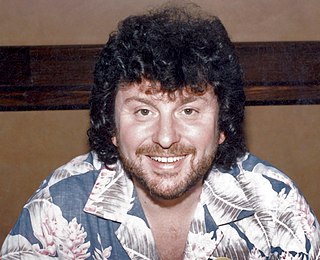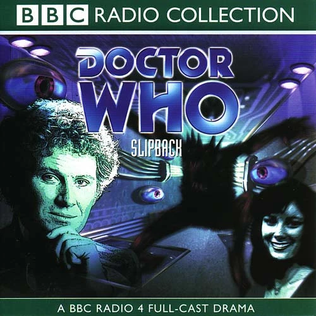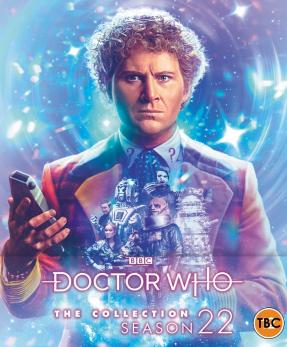Career
Saward's career as a scriptwriter began with drama for radio while he was working as a teacher. Later he was able to cross into full-time writing. He was approached by then Doctor Who script editor Christopher H. Bidmead to submit some ideas to the series on the strength of a recommendation from the senior drama script editor at BBC Radio. He received a commission to write the story The Visitation . This in turn led to his appointment as script editor on the recommendation of Antony Root, who had briefly replaced Bidmead. [4] In addition to his role as script editor, Saward also wrote the television stories Earthshock , [5] Resurrection of the Daleks [6] and Revelation of the Daleks . [6]
Saward also wrote the 1983 short story Birth of a Renegade in the special magazine published by Radio Times at the time of "The Five Doctors" (1983), the 20th Anniversary Special' (and Starlog Press in the United States) and the 1985 radio play Slipback which was broadcast on Radio 4. [7] He wrote the novelisations of The Twin Dilemma and Attack of the Cybermen, as well as those of The Visitation and Slipback, for Target Books' Doctor Who range. Earthshock was novelised by Ian Marter. [8] Saward eventually wrote novelisations of both of his Dalek stories, which were published in 2019. [9]
Doctor Who producer John Nathan-Turner and Saward aroused controversy in 1985 because many of the stories of Colin Baker's first season as the Sixth Doctor contained numerous scenes of graphic violence and darker themes, which many commentators believed was inappropriate for a programme aimed at a family audience (the season featured acid baths, hangings, cell mutation experiments, executions by laser, cannibalism, poisonings, stabbings, suffocation by cyanide and a man having his hands crushed). Disapproval came from members of the general public, some Doctor Who fans, and BBC 1 controller Michael Grade publicly criticised the violence featured in the season and gave it as one of his reasons for putting the series on an 18-month hiatus from 1985 until 1986. [10] Saward defended these scenes, saying they were intended to be dramatic and to warn audiences against real-world violence. [11]
Saward had a sometimes strained relationship with Nathan-Turner, which gave rise to occasional tensions behind the scenes. [12] When asked in July 1988, "If you could go back and start again, what would you change?" he replied, "the producer". [13] Saward often objected to Nathan-Turner's insistence on hiring novice Doctor Who writers, which led to Saward having to work hard, not always successfully, on unsuitable scripts submitted by inexperienced contributors. Saward was eventually able to bring veteran writer Robert Holmes back to the series and they became friends before the latter's death. [14] Saward's working relationship with Nathan-Turner deteriorated further. He had disagreed with Nathan-Turner's casting of Baker as the Sixth Doctor [15] and, following the 1985 hiatus, problems peaked during the production of The Trial of a Time Lord in 1986 when he resigned as script editor before completing the season's scripts. He subsequently denounced Nathan-Turner in an issue of Starburst . [16]
After resigning from Doctor Who, Saward's continued an association with the series. In the 1990s, he wrote linking narration for Doctor Who audio releases of missing episodes and later appeared in interviews on DVDs of his serials. [17] [18] He also contributed a short story to the Big Finish Short Trips collection. [19] Saward has not worked in British television since leaving Doctor Who. In 2020, Saward made his first foray into the comic book medium with the eponymous limited series Lytton, centred on the character he created for the Doctor Who serials Resurrection of the Daleks and Attack of the Cybermen. [20]
Doctor Who spin-offs refers to material created outside of, but related to, the long-running British science fiction television series Doctor Who.
The Five Doctors is a special feature-length episode of the British science fiction television series Doctor Who, produced in celebration of the programme's 20th anniversary. It had its world premiere in the United States, on the Chicago PBS station WTTW and various other PBS member stations on 23 November 1983, the anniversary date. It was transmitted on BBC1 in the United Kingdom two days later.

John Turner, known professionally as John Nathan-Turner, was an English television producer. He was the ninth producer of the long-running BBC science fiction series Doctor Who and the final producer of the series' first run on television. He finished the role having become the longest-serving Doctor Who producer and cast Peter Davison, Colin Baker and Sylvester McCoy as the Fifth, Sixth and Seventh Doctors, respectively.

Tegan Jovanka is a fictional character played by Janet Fielding in the long-running British science fiction television series Doctor Who. An Australian airline stewardess and a native of Brisbane who was a companion of the Fourth and Fifth Doctors, she was a regular in the programme from 1981 to 1984. Tegan appeared in 20 stories.
Peter Grimwade was a British television director and screenwriter, known for his work as a director and writer of the BBC science fiction television series Doctor Who in the 1980s.
Attack of the Cybermen is the first serial of the 22nd season of the British science fiction television series Doctor Who, which was first broadcast in two weekly parts on 5 and 12 January 1985. It was credited to the pseudonymous author "Paula Moore"; the level of contributions made by Paula Woolsey, Eric Saward and Ian Levine have been disputed. Beginning with this serial and continuing for the remainder of Season 22, episodes were 45 minutes in length ; for syndication, in some markets, this serial is re-edited into four 25-minute segments.
Earthshock is the sixth serial of the 19th season of the British science fiction television series Doctor Who. It was first broadcast in four twice-weekly parts on BBC1 from 8 to 16 March 1982. This serial marks the final regular appearance of Matthew Waterhouse as Adric and his death, with the final episode featuring unique silent credits in loving memory of the character. It is also the first to feature the Cybermen since Revenge of the Cybermen in 1975.
Resurrection of the Daleks is the fourth serial of the 21st season in the British science fiction television series Doctor Who, which was first broadcast in two weekly parts on BBC1 between 8 February and 15 February 1984. The serial was intended to be transmitted as four 23-minute episodes but a late scheduling change by the BBC meant that it was transmitted as two episodes of 46 minutes; reruns restored it to its intended format.
Warriors' Gate is the fifth serial of the 18th season of the British science fiction television series Doctor Who. It was written by Stephen Gallagher and was first broadcast in four weekly parts on BBC1 from 3 to 24 January 1981.
Revenge of the Cybermen is the fifth and final serial of the 12th season of the British science fiction television series Doctor Who, which was first broadcast in four weekly parts on BBC1 from 19 April to 10 May 1975. It was the first to feature the Cybermen since The Invasion (1968) and the last until Earthshock (1982).
Revelation of the Daleks is the sixth and final serial of the 22nd season in the British science fiction television series Doctor Who, which was first broadcast in two weekly parts on 23 and 30 March 1985. This was the final serial to be broadcast in 45-minute episodes; this format would return 20 years later when the series resumed in 2005. Revelation of the Daleks is the only time the Sixth Doctor encountered the Daleks in a television story.
The Invasion is the partly missing third serial of the sixth season of the British science fiction television series Doctor Who, which was first broadcast in eight weekly parts from 2 November to 21 December 1968.
The Awakening is the second serial of the 21st season of the British science fiction television series Doctor Who, which was originally broadcast on BBC1 on 19 and 20 January 1984.

Slipback is a radio audio drama based on the long-running British science fiction television series Doctor Who, produced by the BBC and first broadcast in six episodes on BBC Radio 4 from 25 July to 8 August 1985, as part of a children's magazine show called Pirate Radio Four. It was later released on cassette and CD, most recently by BBC Audio and free with the 27 April 2010 edition of The Daily Telegraph newspaper via WHSmith.

The Nightmare Fair is a story originally written for the 1986 season of Doctor Who, but never filmed. A novelisation based on the script was published in 1989 by Target Books, as the first volume of its Missing Episodes series. The script and novelisation were written by former series producer Graham Williams, and would have been directed by Matthew Robinson had it gone to air. It is the first novel-length text featuring The Doctor not to be based upon a previously transmitted production, although being a novelisation it is not strictly speaking an "original" novel.
Nicholas Pegg is a British actor, director and writer.

The twenty-fifth season of British science fiction television series Doctor Who began on 5 October 1988. It comprised four separate serials, beginning with Remembrance of the Daleks and ending with The Greatest Show in the Galaxy. To mark the 25th anniversary season, producer John Nathan-Turner brought back the Daleks and the Cybermen. The American New Jersey Network also made a special behind-the-scenes documentary called The Making of Doctor Who, which followed the production of the 25th anniversary story Silver Nemesis. Andrew Cartmel script edited the series.

The twenty-second season of British science fiction television series Doctor Who began on 5 January 1985 and ended on 30 March 1985. It opened with the serial Attack of the Cybermen and ended with the serial Revelation of the Daleks. The season returned to the traditional Saturday transmission for the first time since Season 18, but for the first and only time in the series' first run it featured 45-minute episodes in its entirety. During transmission, BBC1 controller Michael Grade announced an 18-month hiatus for the series, partly citing the violence depicted in the stories of the season. John Nathan-Turner produced the series with Eric Saward as script editor.

The nineteenth season of British science fiction television series Doctor Who began on 4 January 1982 with Castrovalva, and ended with Time-Flight. John Nathan-Turner produced the series, with two script editors: Anthony Root and Eric Saward.






